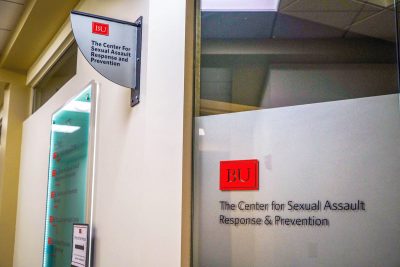
Boston University will be conducting a sexual misconduct student survey early next year as a part of the Association of American Universities (AAU) 2019 Campus Climate Survey.
The survey, which follows a similar one carried out in 2015, will use scientific methodology to better understand students’ attitudes toward and experiences surrounding sexual assault and misconduct, according to AAU Communications Officer Melissa Luke.
“Results of the 2019 survey will help university administrators facilitate conversations on campus about this important topic,” Luke wrote in an email, “and formulate evidence-based policies and practices intended to reduce sexual assault and sexual misconduct on campus.”
Participation in the survey is voluntary, Luke wrote, as some universities either perform their own surveys or participate in either state university system or state-mandated surveys.
Kim Randall, BU’s Title IX coordinator, said the survey will provide the university with a better understanding of sexual misconduct at BU and how to prevent it.
“[The survey] will help us understand what kind of information and material to send out to students, find other ways that might be effective to reach students and direct our education and training,” Randall said.
BU first conducted a similar but separate survey on the issue in 2015, which Randall said went well but was difficult to put together. BU has been able to personalize its participation in the AAU survey and provide some input to compare their data with similar universities, she said.
Having comparable data, Randall said, will allow BU to explore sexual assault prevention methods other schools are using, in addition to sharing what BU has been doing well.
Brian Lewis, a first-year graduate student in the College of Engineering, said he thinks comparing BU’s data with that of other universities will show what works in security and reporting processes of sexual misconduct.
“Some schools may just have a difficult process for reporting such harassment, and some people may feel intimidated by the process,” Lewis said. “So, I think [by] aggregating all the schools together you can see which school has the process that works best.”
BU spokesperson Colin Riley wrote in an email that the new data from this survey will help BU improve its policies on sexual misconduct prevention and response.
“This is part of a comprehensive approach to assessing the campus climate,” Riley wrote, “and providing improvements to education, training, and services.”
Katharine Mooney, director of Wellness and Prevention Services, said the survey will provide an opportunity for the BU community to give the university feedback on its strengths and weaknesses in sexual assault prevention.
“BU engaging in this climate survey is going to provide us with a lot of information about how we can do the best prevention work on our campus,” Mooney said. “We will be able to identify priority populations within our community that may need extra support or prevention programming.”
Mooney said the survey will also help identify gaps in student awareness of available resources which the university can then aim to improve. Collaboration throughout the university will likely help BU address the survey results, she said.
“It is essential that we take a wide approach to these problems [and] work together to approach them,” Mooney said. “That’s the only way that we’re going to be effective and prioritize what the needs are in our community and what we can do to address those needs.”
Alex Ives, a senior in the Questrom School of Business, said he thinks it will be hard for students to talk about such traumatic experiences, but it’s something that needs to be addressed on BU’s campus and everywhere.
“If BU wants to continue to be a leader of pursuing [its] ideals and making a safer community for everyone involved,” Ives said, “I think to start with getting the most information possible is definitely a smart idea.”
This article was updated on June 11, 2025, to remove a source who expressed concern that their inclusion caused personal distress.




















































































































